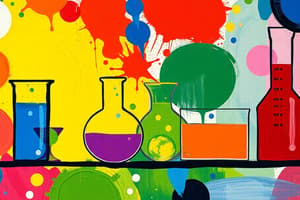Podcast
Questions and Answers
What is matter?
What is matter?
Anything that has mass and takes up space
What is a substance?
What is a substance?
A single kind of matter that is pure and has a specific set of properties.
What is a mixture?
What is a mixture?
A combination of two or more substances that are not chemically combined
What is an element?
What is an element?
What is a compound?
What is a compound?
What is a colloid?
What is a colloid?
What is a suspension?
What is a suspension?
What is the Tyndall Effect?
What is the Tyndall Effect?
Differentiate between a homogeneous mixture and a heterogeneous mixture.
Differentiate between a homogeneous mixture and a heterogeneous mixture.
Explain the main difference between a compound and a mixture.
Explain the main difference between a compound and a mixture.
______ a flow chart to represent how matter can be classified.
______ a flow chart to represent how matter can be classified.
Classify each of these samples of matter as an element, a compound, or a mixture:
Classify each of these samples of matter as an element, a compound, or a mixture:
Study Notes
Classification of Matter
- Matter: Defined as anything that possesses mass and occupies space.
- Substance: A pure form of matter with a specific set of properties, representing only one type of material.
Types of Mixtures
- Mixture: A combination of two or more substances that are physically blended but not chemically bonded.
- Homogeneous Mixture: Components are uniformly distributed, appearing as a single phase; examples include solutions.
- Heterogeneous Mixture: Components are not uniformly distributed, leading to visible differences; examples include salads or gravel.
Pure Substances
- Element: A fundamental substance consisting solely of one type of atom, cannot be broken down into simpler substances.
- Compound: A pure substance formed when two or more different elements chemically join together through chemical bonds.
Special Mixtures
- Colloid: A mixture with small, undissolved particles that do not settle out, maintaining a stable dispersion.
- Suspension: A mixture containing larger particles that can be observed and separated through settling or filtration.
- Tyndall Effect: The phenomenon where light is scattered by colloidal particles, making the beam visible.
Key Differences
- Compound vs. Mixture: Compounds consist of elements chemically combined, while mixtures involve the physical combination of substances without any chemical change.
Practical Classification Examples
- Examples of Matter Classification:
- Table sugar: Compound
- Tap water: Mixture
- Cough syrup: Mixture
- Nitrogen: Element
Visual Representation
- Flow Chart: A visual tool to categorize matter into substances (elements and compounds) and mixtures (homogeneous and heterogeneous).
Studying That Suits You
Use AI to generate personalized quizzes and flashcards to suit your learning preferences.
Description
This quiz explores the classification of matter, including definitions of substances, mixtures, and their types. Dive into the characteristics of homogeneous and heterogeneous mixtures, as well as pure substances like elements and compounds. Test your understanding of these foundational concepts in chemistry!




